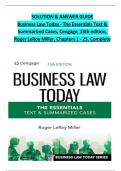SOLUTION & ANSWER GUIDE
Business Law Today - The Essentials Text &
Summarized Cases, Cengage, 13th edition,
Roger LeRoy Miller, Chapters 1 - 25, Complete
,CHAPTER 1: Legal and Constitutional Foundations of Business
—Appendix to Chapter 1: Finding and Analyzing the Law
CHAPTER 2: Courts and Alternative Dispute Resolution
CHAPTER 3: Ethics in Business
—Appendix to Chapter 3: Code of Ethics Example
CHAPTER 4: Tort Law
CHAPTER 5: Intellectual Property Rights
CHAPTER 6: Internet Law, Social Media, and Privacy
CHAPTER 7: Criminal Law and Cyber Crime
CHAPTER 8: Agreement and Consideration in Contracts
CHAPTER 9: Capacity, Legality, and Enforceability
CHAPTER 10: Contract Performance, Breach, and Remedies
CHAPTER 11: Sales and Lease Contracts
CHAPTER 12: Performance and Breach in Sales and Lease Contracts
CHAPTER 13: Negotiable Instruments
CHAPTER 14: Banking
CHAPTER 15: Creditors’ Rights and Bankruptcy
CHAPTER 16: Agency Relationships in Business
CHAPTER 17: Employment Law
CHAPTER 18: The Entrepreneur’s Options
,CHAPTER 19: Corporations
CHAPTER 20: Investor Protection, Insider Trading, and Corporate
Governance
CHAPTER 21: Antitrust Law and Promoting Competition
CHAPTER 22: Consumer Law
CHAPTER 23: Personal Property, Bailments, and Insurance
CHAPTER 24: Real Property and Environmental Law
CHAPTER 25: International and Space Law
, Solution and Answer Guide
Miller, Business Law Today, The Essentials Text & Summarized Cases 13e,
9780357635346;Chapter 01: Legal and Constitutional Foundations of Business
Table of Contents
Critical Thinking Questions in Features......................................................................................................... 1
Adapting the Law to the Online Environment .......................................................................................... 1
Critical Thinking Questions in Cases ............................................................................................................. 2
Case 1.1 ..................................................................................................................................................... 2
Case 1.2 ..................................................................................................................................................... 3
Case 1.3 ..................................................................................................................................................... 3
Chapter Review ............................................................................................................................................. 4
Practice and Review .................................................................................................................................. 4
Practice and Review: Debate This ............................................................................................................. 5
Issue Spotters ............................................................................................................................................ 5
Business Scenarios and Case Problems..................................................................................................... 5
Critical Thinking and Writing Assignments ............................................................................................. 10
Critical Thinking Questions in Appendix Exhibit 1A–3 ................................................................................ 11
Exhibit 1A–3 ............................................................................................................................................ 11
Critical Thinking Questions in Features
Adapting the Law to the Online Environment
1. One observer has said that the American legal system should evaluate social media companies based on
how ―they affect us as citizens, not only [on how] they affect us as consumers.‖ What is your opinion of
this statement?
Solution
The person who made this statement clearly sees a ―citizen‖ as having different motivations and concerns
than a ―consumer.‖ Presumably, a citizen is mostly concerned with the good of society as a whole, and
therefore would be open to the idea of government regulation that restricted thenegative influence of
social media, regardless of the First Amendment. A consumer, by contrast, would be primarily concerned
with having a marketplace that offers the widest possible varieties of freedom (of choice, of speech, etc.)
and would for that reason be opposed to government regulation of social media. There is, however, an
argument to be made that the citizens that make up a society benefit when the marketplace of ideas—
whether they are subjectively
―positive‖ or ―negative‖—is allowed to flourish in the absence of government regulation.
2. Tim Cook, Apple‘s chief operating officer, has suggested that the United States Congress shouldpass a
law limiting the ability of Apple and other tech countries to keep consumer data private. Why would a
business executive make such a request?




